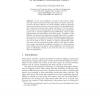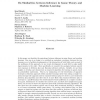88 search results - page 15 / 18 » Learning to Coordinate Actions in Multi-Agent-Systems |
AAMAS
2006
Springer
13 years 7 months ago
2006
Springer
Abstract. There are many domains in which a multi-agent system needs to maximize a "system utility" function which rates the performance of the entire system, while subje...
AI
2006
Springer
13 years 11 months ago
2006
Springer
So far, most equilibrium concepts in game theory require that the rewards and actions of the other agents are known and/or observed by all agents. However, in real life problems, a...
AAAI
2010
13 years 9 months ago
2010
Embedded systems consisting of collaborating agents capable of interacting with their environment are becoming ubiquitous. It is crucial for these systems to be able to adapt to t...
JAIR
2008
13 years 7 months ago
2008
In this paper, we elucidate the equivalence between inference in game theory and machine learning. Our aim in so doing is to establish an equivalent vocabulary between the two dom...
IJCAI
2007
13 years 9 months ago
2007
Behavioral norms are key ingredients that allow agent coordination where societal laws do not sufficiently constrain agent behaviors. Whereas social laws need to be enforced in a...


